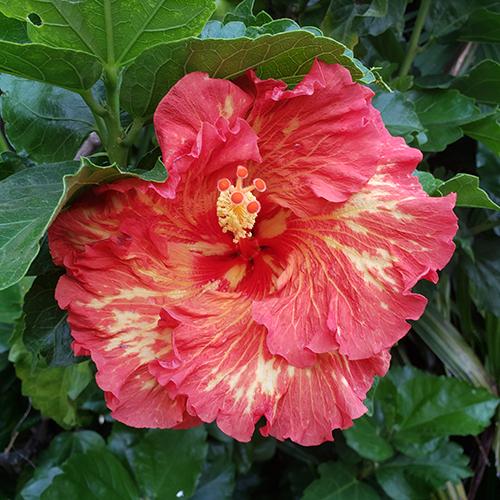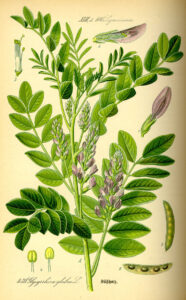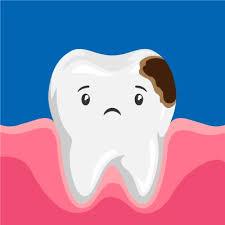
Benefits of Hibiscus
Hibiscus helped save our puppy We found a pedigree Golden retriever for sale for $50 in the local paper. At the time, they were selling

One of the benefits of licorice root may well be summarized in Mary Poppins’ attestation, “a spoonful of sugar makes the medicine go down.”
The root contains a compound about 50 times sweeter than sugar – a property which comes in handy for helping to ‘disguise’ other less favorable flavors in an herbal remedy!
In fact, some folks give their children a slice of raw licorice root to chew on, instead of candy.
Licorice (Glycyrrhiza glabra), is a flowering plant of the bean family Fabaceae, an herbaceous perennial legume native to Western Asia, North Africa, and Southern Europe.
In traditional Chinese medicine, licorice is known as “The Great Harmonizer” as one of the benefits of licorice root is that it balances the bitter flavors and synergizes the herbs in a formula, while promoting their even distribution in the twelve major meridians.

The known benefits of licorice root date back to ancient Egypt, where the root was made into a sweet drink for pharaohs.
Highly valued for its soothing action on mucous membranes, many people today use licorice root to treat ailments such as heartburn, acid reflux, hot flashes, coughs, and bacterial and viral infections.
Traditionally used for coughs and asthma, it can help rid the lungs of phlegm and mucous.
It is also beneficial for peptic (stomach and duodenal) ulcers, regulating the quality and quantity of protective mucous that is produced in the stomach while inhibiting the bacteria associated with most ulcers.
Another of the benefits of licorice root is its use in topical gels claimed to treat skin conditions such as acne or eczema.
Surprisingly, many licorice candies are flavored not with licorice root but with anise oil — an essential oil from the anise plant (Pimpinella anisum).
While licorice contains hundreds of plant compounds, the primary active compound is glycyrrhizin, the glycoside responsible for the root’s sweet taste, as well as its anti-inflammatory, antimicrobial and antioxidant properties.
However, glycyrrhizin is also linked to many of the adverse effects. As a result, some products use deglycyrrhizinated licorice (DGL), which has had the glycyrrhizin removed.
Licorice root is used both as a flavoring agent and medicinal treatment. It comes in many forms, including teas, capsules, liquids, and even topical gels.
Due to its content of numerous plant compounds with antioxidant and anti-inflammatory effects, licorice root extract has been studied for its protective effects against certain types of cancer.
In particular, licorice extract and its compounds have been linked to slowing or preventing cell growth in skin, breast, colorectal, and prostate cancers and may help treat oral mucositis, painful mouth sores that people with cancer sometimes experience as a side effect of chemotherapy and radiation.
Licorice root may help protect against bacteria that can lead to cavities.

Test-tube studies show licorice root extract to be effective at protecting against bacteria commonly linked to cavities and tooth decay.
Licorice root extract is tied to several other potential benefits. It may:
The Food and Drug Administration (FDA) has deemed licorice root to be generally recognized as safe for use in foods.
Additionally, the short-term use of licorice root supplements and teas is widely considered safe. However, large doses may produce adverse effects, and individuals with certain health conditions may wish to avoid it.
Both chronic use and large doses of licorice root products may lead to glycyrrhizin accumulation in your body.
Elevated levels of glycyrrhizin have been shown to cause an abnormal increase in the stress hormone cortisol, which may cause imbalances in your fluid and electrolyte levels.
As a result, chronic and large doses of licorice root products may trigger several dangerous symptoms, including :
Licorice root has been shown to interact with several medications, including:
People taking any of these medications should avoid licorice root products unless their healthcare provider instructs otherwise.
Chronic use and large doses of licorice root can cause severe fluid and electrolyte imbalances. Children, pregnant and breastfeeding women, and those with kidney disease, heart disease, or high blood pressure should avoid licorice products.
Learn more about herbal remedies in hybrid classes at Self-Heal School
Teaching comprehensive holistic education since 1985.
We are currently offering interactive hybrid courses including Herbal Fundamentals, Energy Healing, Aromatherapy and Clinical Herbology
Hybrid means you may choose to participate in each individual class in the hybrid course online or in person.
All of our products are made with love from organic, all-natural and ethically sourced ingredients.
We began making and perfecting our own herbal remedies more than thirty years ago and offer our favorite products for purchase.

Hibiscus helped save our puppy We found a pedigree Golden retriever for sale for $50 in the local paper. At the time, they were selling
Hawthorn Berry Hawthorn is known as the heart herb for its many benefits as a heart tonic. The berry has been a key part of

Can you take herbal supplements to arm your immune system? You probably know that zinc, vitamin D and vitamin C are gotta-have-its. How about herbal

While attending San Diego State College in the early seventies, my work-study job was in the vivarium, a room for keeping and raising animals for